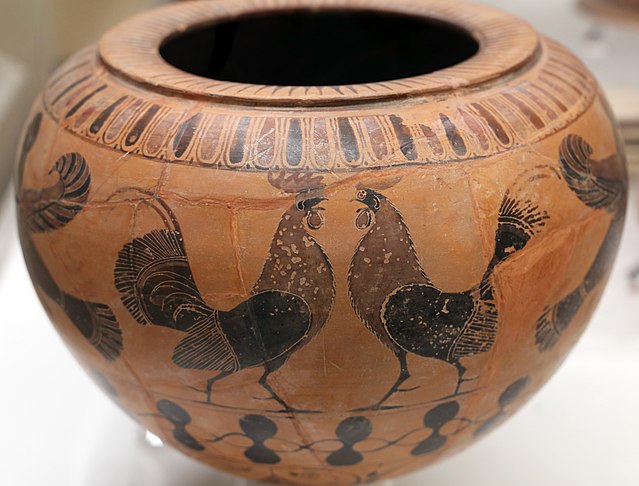Alectryon in Greek mythology, was a young soldier who was assigned by Ares, the god of war, to guard the outside of his bedroom door while the god took part in a love affair with the love goddess Aphrodite. Alectryon however failed at his job when he fell asleep, allowing Helios, the god of the Sun, to see the two lovers and alert Hephaestus, the husband of Aphrodite, thereupon Ares changed him into a rooster in anger, in an etiological myth that attempts to explain the origin of roosters and the reason why they crow each morning at dawn, warning of the Sun approaching. The myth is not mentioned by Homer, who first related the story of Ares and Aphrodite's infidelity in his Odyssey, but rather it was interpolated later by various authors.
Two roosters on an ancient Greek black-figure vase from Villa Giulia.
Ares is the Greek god of war and courage. He is one of the Twelve Olympians, and the son of Zeus and Hera. The Greeks were ambivalent towards him. He embodies the physical valor necessary for success in war but can also personify sheer brutality and bloodlust, in contrast to his sister Athena, whose martial functions include military strategy and generalship. An association with Ares endows places, objects, and other deities with a savage, dangerous, or militarized quality.
Cast of a Roman statue from Hadrian's Villa, copied from a Greek original. Traditionally identified as Ares or Hermes.
Ares, 2nd–3rd century AD, after a Greek bronze original by Alkamenes dated 420 BC,[citation needed], excavated in 1925 in Rome's Largo di Torre Argentina
The Ludovisi Ares, Roman version of a Greek original c. 320 BC, with 17th-century restorations by Bernini
The Areopagus as viewed from the Acropolis.



![Ares, 2nd–3rd century AD, after a Greek bronze original by Alkamenes dated 420 BC,[citation needed], excavated in 1925 in Rome's Largo di Torre Argent](https://upload.wikimedia.org/wikipedia/commons/thumb/e/e7/Ares_Argentina_Montemartini.jpg/450px-Ares_Argentina_Montemartini.jpg)

